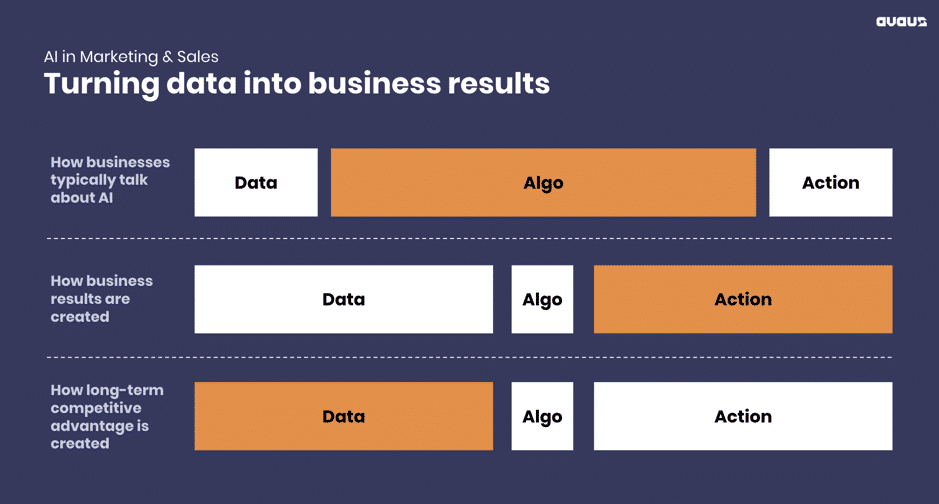Multiple industry analysts (source, 2019) confirm that between 50-80% of analytics initiatives fail to deliver the planned business value. One of the main reasons for this is the inability to successfully operationalise the algorithms. In other words – going from Data to Algo is easy, going from Algo to Action is hard. To help out business leaders with this challenge, we at Avaus created a Cookbook: AI in Marketing and Sales, with 50 recipes focusing on the must-win equation: data, algo and action.
Typically, when businesses talk about AI, 80% of the focus goes into the algo variable of the equation and only a little on data collection and preparation, not to mention action and activation. To create business results and long term competitive advantage, the focus needs to be divided differently. The perfect big picture recipe is more likely to be something in the lines of 40-20-40: 40% for data preparation, 20% on model development and 40% on operationalisation. As Data and Analytics solutions develop and Citizen Data Scientists will increasingly prevail, the effort required for ‘Algo’ will likely decrease further.
To get this equation right, we encourage you to focus on two things: end-to-end POCs (proof of concepts) and operationalisation.

End-to-end PoCs are a must
The ‘Action’ piece of your end to end process is what delivers business results, or fails to do so if not planned for. A typical first step once data has been gathered and made available for analytical modelling is to launch a disparate set of PoCs – all with an algo-only focus. While this is a great start – it will not create long-term success. To ensure success in the long run, it should be agreed early on as to what a successful PoC should look like, and what taking it to the Pilot stage and then production should entail – from an end to end perspective. A successful analytical PoC should be seen as a multi-phased approach. This ensures that not only data and algorithms are able to deliver value as planned, but also that the organisation is ready to operationalise the model – both technically and also from a process and change perspective.
Focus on operationalisation
The analytical work typically gets most of the attention, but where the business impact happens is in the operationalisation of the models. This includes both technical deployment and maintenance of the models, as well as integrations to business processes. In the case of Marketing and Sales – typically model outputs need to be integrated with the solutions in your martech stack and in customer processes running across multiple customer-interfacing platforms.
A good rule of thumb, resource and effort-wise, is that Data and Action (Operationalisation) take up approximately 80-90% of time spent, and algorithm modelling only around 10-20%. To increase efficiency in both “Data” and “Action” steps, a Machine Learning framework and standardisation of the operationalisation processes will help.
To learn more about how you can turn your customer data into business results, download the Avaus Cookbook: AI in Marketing and Sales:
Download Avaus Cookbook